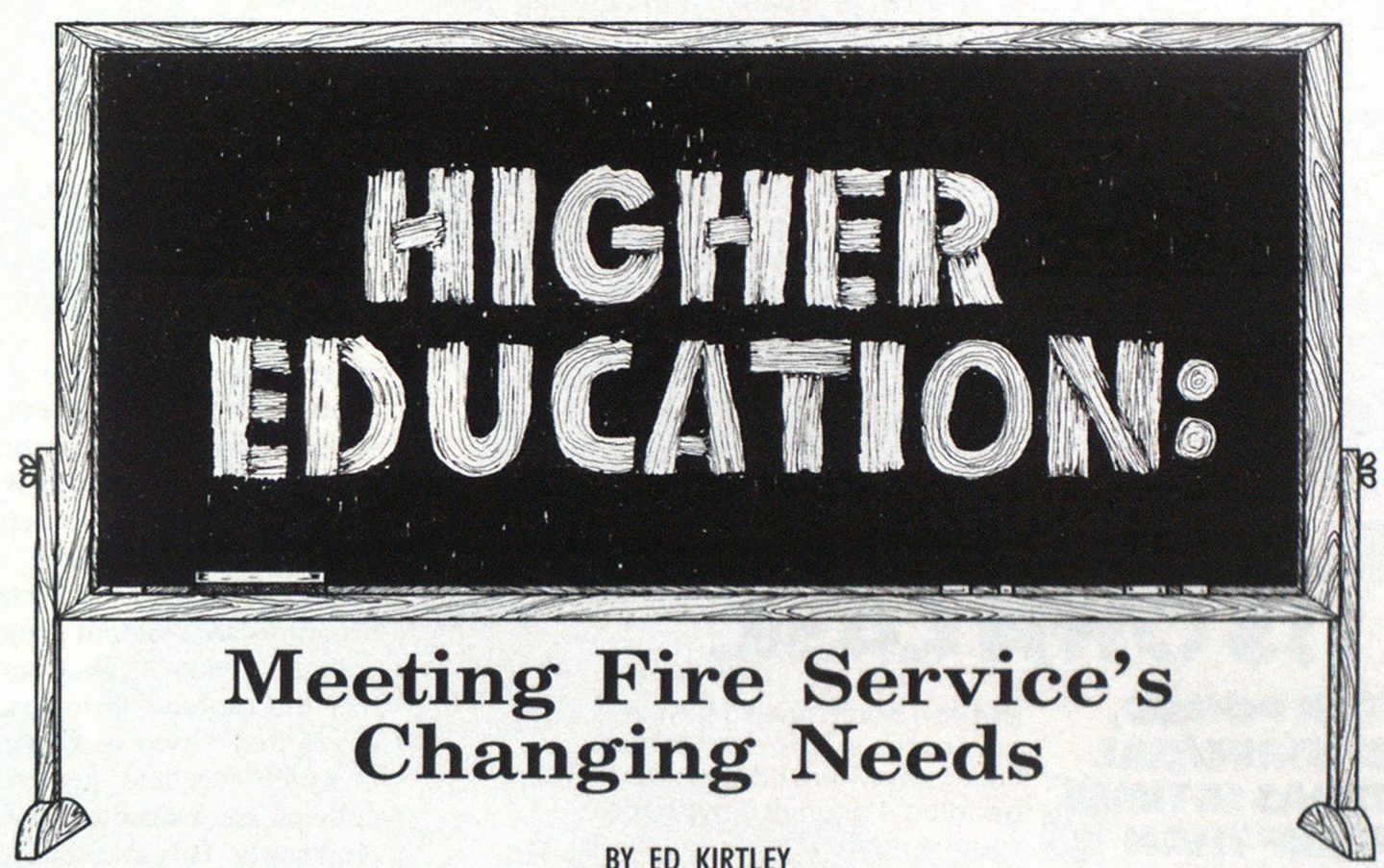
HIGHER EDUCATION: Meeting Fire Service’s Changing Needs
EDUCATION

AS THE FIRE service progresses and changes, so too must the education of its members. Not too long ago, the firefighter simply had to know basic fireground operations, and the fire officer had to master basic strategy and tactics. Hazardous materials, fire protection engineering, code enforcement, and personnel administration were remote concepts. Not so today: As these tasks become more and more commonplace, each member of the fire service, from the line firefighter to the fire officer, must seek additional training and skills to function more effectively. This educational urgency applies to the entire fire service—volunteer and paid.
Basic firefighting skills are essential. They have been and continue to be the foundation of fire service education. It is important to note that firefighters usually form attitudes toward their fire service education at this point in their careers. How the young firefighter comes to this learning process and the quality of education he receives has a great bearing on his willingness and enthusiasm to approach the more advanced and specialized areas of expertise demanded of modern fire service leaders.
Emergency medicine, apparatus operation, code enforcement, fire investigation, haz mats, and heavy rescue require a lot of training. Subjects such as general management, personnel supervision, program administration, finance and budget management, and government legislation place additional demands on the training staffs of both fire departments and state organizations. These areas are critical to the effectiveness of the fire officer and administrator as well as to career path toward top linemanagement qualifications, but they are usually not within the scope of a department training program. So where can those who are eager to continue their education outside the department do so?
WHAT TO LOOK FOR
Higher education in the fire service is both necessary and in great demand. The two-year and four-year degree programs can be the way to pursue supervisory, managerial, and administrative education. Many community colleges and four-year colleges have already instituted programs, but their efforts are not enough. Many colleges do not have fire science or fire service administration or even municipal management programs. Most do have generic business/management programs, but these usually do not address the specific problems of the fire service or municipal government. Nor do most institutions recognize the problems associated with the work schedules of fire service students. Often personnel will abandon hopes of higher education simply because of scheduling conflicts. Instead they should look for programs that better suit their needs.
A good program should include several basic components. The colleges should be encouraged to tailor programs to fire service personnel who currently or will eventually serve in a supervisory capacity. Thus the program should contain courses in personnel supervision, department organization and structure, strategy and tactics, program and department administration, and litigation issues pertaining to the fire service. Many of the courses already available in the business curriculum will satisfy these needs, but some subjects still are unique to the fire service.
EDUCATION
HIGHER EDUCATION
Do the classes have to be part of a degree program? Although the most important consideration in selecting classes is availability, it is advantageous to students to be able to build toward a recognized, accredited degree, preferably in fire science or fire administration. Two-year programs should fit into the requirements of a four-year program, in case students continue their education at a later time or at a different institution. Local fire service leaders should assist in program design in keeping with the guidelines of the institution. When applicable, the course content should include or be guided by national professional standards. This is crucial if the program is to withstand critical review.
OTHER OPTIONS
The four-year Open Learning Fire Service Program provides quality education toward a degree in either fire administration or fire protection technology. The program, currently administered by seven regional institutions, contains 12 courses dealing with fire service issues. Proven to be an effective program in the past, this is a promising alternative for the student desiring a four-year college degree.
Most two-year, associate’s degree programs are resident programs at local colleges. Pikes Peak Community College in Colorado Springs, Colorado, has developed a two-year degree program in which core and elective fire science courses are available through independent study. This saves students from the typical class scheduling and attendance problems and allows them to accelerate at their own pace. Many of the general education courses are also available through independent study from either Pikes Peak Community College or other accredited institutions. Another advantage of this independent study program is the flexibility of the required electives. Students may tailor those electives to meet their individual needs in such areas as accounting, management, chemistry, and finance.
Juggling work and continuing education in the fire service is a tough problem, and one that is not likely to go away. Solving it requires the support of twoand four-year institutions around the country as well as the fire service. The courses and programs must be timely, must be up-to-date, and must meet students’ needs. Students must be able to apply their knowledge to their work on a daily basis. Only through such tailored programs will these students be ready to lead the fire service in the 21st century.

